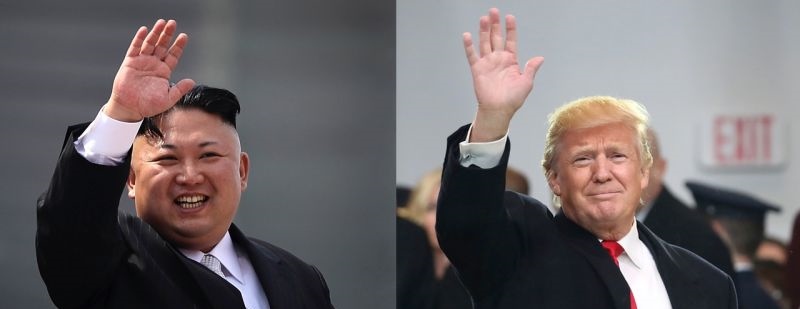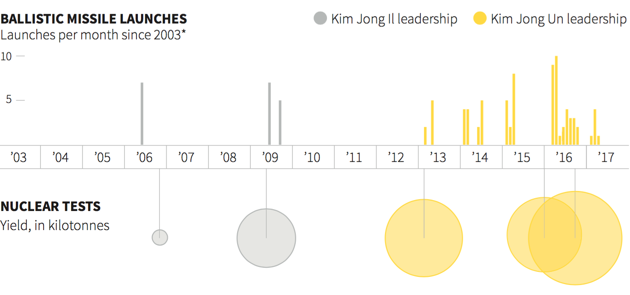How to tackle North Korea?
November 30, 2017 | Expert Insights

North Korea has tested its most potent intercontinental ballistic missile (ICBM) in November 2017. This indicate a serious escalation in the Korean peninsula. US President Donald Trump has called for all nations to isolate North Korea. Will these strategies work?
Background
The relationship between the US and North Korea has always been fractious. During the war between North and South Korea in 1950, US forces successfully intervened on behalf of South Korea. To this day, there are 28,500 American soldiers, sailors, airmen and Marines in South Korea as part of United States Forces Korea (USFK).
North Korea has remained an isolated nation for decades. Its nuclear program has especially been a concern for the international community. In 2017, North Korea has launched 23 missiles in the span of 16 tests. It has increased its military activity since July of 2017 when it test launched two intercontinental ballistic missiles (ICBM). In August 2017, North Korea flew two missiles over Japan. The nation called it the “first step” in its Pacific operations. In September 2017, the nation has conducted its sixth nuclear test to date.
The UN has imposed harsh sanctions on North Korea in retaliation. The resolution targets North Korea's primary exports and could significantly cut into the country’s annual export revenue. Additionally, Nikki Haley the US ambassador to the United Nations has warned that the US is ready to take military action.

Analysis
In November 2017, North Korea after seemingly two months of silence, tested its most potent missile yet. The Hwasong-15 missile reached an unprecedented height of almost 4,500 kilometers (2,800 miles). The Hwasong-15 is a new type of intercontinental ballistic missile. This represents a serious escalation in the stability of the Korean peninsula.
In the past, Trump has taken an aggressive stance while countering North Korea. He has even said that the country “will be met with fire and the fury like the world has never seen.” North Korea pushed President Donald Trump closer to a set of excruciating choices. After the latest development, Trump reporters at the White House, “I will only tell you that we will take care of it. ... It is a situation that we will handle.” He later tweeted, "After North Korea missile launch, it's more important than ever to fund our gov't & military! Dems shouldn't hold troop funding hostage for amnesty & illegal immigration. I ran on stopping illegal immigration and won big. They can't now threaten a shutdown to get their demands.”
This is not dissimilar to earlier rhetoric from Washington. The nation’s top diplomats have often noted that a military conflict was not out of the table. In addition, other world leaders like Russian President Vladimir Putin have admitted that sanctions may not deter North Korea.
However, Trump has determinedly stated that the US would only enter dialogue with North Korea if the latter completely shut down its nuclear programme. In turn, North Korea has stated this will never happen. The latest missile now proves that North Korea is a legitimate threat to the United States. Its missile can now strike any part of the United States including Washington and New York. Despite efforts to curb the nuclear program, the international community and the US policymakers will have to accept that North Korea has become a nuclear power now and the door to end it has closed. Barring an invasion, the US does not have the option to end this as North Koreans have little reason to give up their weapons programs.
United States and the international community must also accept that China is not going to solve the problem. China can put a lot of pressure on little North Korea, but nothing that is likely to deter the North Korean leader from holding onto nuclear weapons especially if he believes that there is legitimate threat of national destruction. In the recent years, North Korea and China have remained at loggerheads with one another and the relationship has deteriorated. North Korea’s weapons tests often seemed timed to humiliate and defy Beijing.
In September 2017, Putin put it plaintively that North Korea will not yield to sanctions. Russian President said that while North Korean actions were “provocative,” sanctions will be ultimately useless. He said, “They'd rather eat grass than abandon their [nuclear weapons] program unless they feel secure. And what can establish security? The restoration of international law. We should promote dialogue among all interested parties.” His words have been proven right as North Korea continued to test ICBMs despite harsh sanctions from the UN.
Assessment
Our assessment is that North Korean leader Kim Jong Un will not make the same mistake made by Gaddafi. Under duress from the US, the Libyan leader had agreed to shut down the nuclear program and also reach out to the North Korean leadership to do the same. After having done this, the US supported a multi-state NATO-led military intervention in Libya that resulted in the humiliation and death of Gaddafi. We feel that Kim Jong Un will not commit the same mistake.








Comments